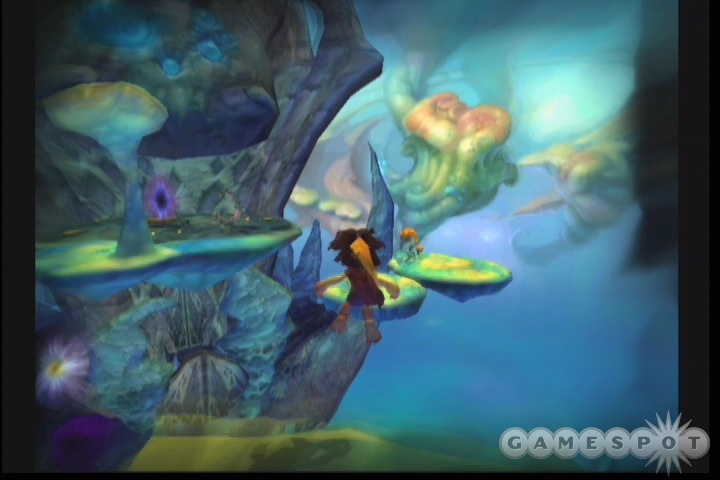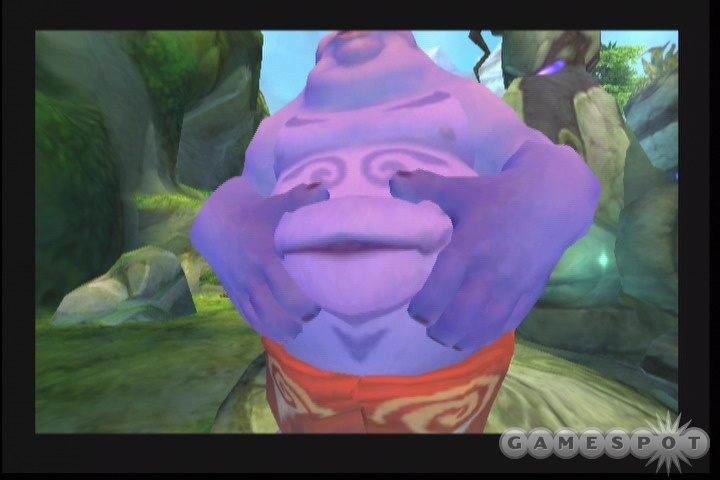Last year's Tak and the Power of Juju was a decent 3D platformer that made up for some of its technical shortcomings by providing a pleasantly surreal setting and by spiking the action with a bit of goofy humor. Thanks to these factors and, no doubt, the Nickelodeon seal of approval, Tak found an audience. Now, Avalanche is back with Tak 2: The Staff of Dreams, which earnestly tries to improve upon the first game and is somewhat successful in its efforts. There's a much greater variety to the action, but like The Power of Juju, The Staff of Dreams suffers from needlessly vague level design. The oft-confusing level designs are especially hurtful, because Tak 2 is otherwise pretty simple, straightforward, and aimed squarely at a younger audience.

As the game kicks off, we catch up with Tak while he's taking a serious power nap--a 16-day power nap, to be more specific. In fact, Tak's mentor, Jibolba, has been unable to rouse him from his slumber. During this deep sleep, Tak has a vision in which he is instructed to save a princess from the malevolent dream guardian. Tak has certainly borne witness to stranger things, and after some consideration and a bit of coercion, he goes with it, thereby accepting this dream quest. Eventually waking from his slumber, Tak tells Jibolba of this unusual dream, and so they set off to talk to Jibolba's brother JB (whose initials literally stand for "Jibolba's Brother"), who is well-versed in dream interpretation. But things are not quite what they seem in the dream world, and you can expect a significant, if not a predictable, twist about halfway through the game. Even still, the storytelling here feels a little halfhearted, and it feels like the plot only makes itself relevant when the game needs a good reason to transition to a new area. It does provide a few good laughs, which come mostly at the expense of the dimwitted warrior Lok (voiced expertly by the current, standing king of Don Quixote-esque wannabe heroes, Patrick Warburton), who has tagged along for the trip in hopes of getting in on some of that princess business. If nothing else, the cinematic sequences certainly lend a jovial, slightly off-kilter feel to the game.
Tak and the Power of Juju was a pretty straight-ahead platformer, and Tak 2 offers a similar experience, though it definitely shifts the focus more squarely to light puzzle-solving, combat, and platform-jumping, while also moving the gameplay away from the obsessive-compulsive item collection that bogged down Tak and the Power of Juju. The game is still littered with all manner of collectibles--like tiny critters, fruits, precious stones, and mystical scrolls, for instance--but most of this stuff is optional now and exists for the purpose of unlocking bonus goodies, like minigames, image galleries, and alternate character appearances and sound effects.
Beyond the stock platformer hero abilities--the double jumps, the basic melee attacks, and so on--Tak starts off the game with a few unusual moves, and the game makes a point of endowing him with additional abilities over the course of its storyline. Before the start of his adventure, Tak's mentor Jibolba turns himself into a flea and hitches a ride on Tak's head. Consequently, there are many puzzles where you'll have to hurl the little shape-shifting-shaman bloodsucker at out-of-reach animals so Jibolba can give them good chomps, which kicks off a Rube Goldberg-like string of events that will eventually allow you to progress. The game grants you a lengthy series of high-powered attacks, but most of the enemies you'll encounter aren't that tough, and the few, basic three-button combos you have from the start tend to be adequate enough.
Some of the abilities you're given are pretty general purpose, such as a short burst of speed when running, which is good for clearing large gaps or escaping especially tenacious threats. However, many of these abilities exist purely for the purpose of solving the game's many puzzles. Early on, you'll get a bola that can be used to flip switches from far away, ensnare enemies, or grapple onto special posts so you can pull yourself toward them. In the latter portions of the game, you'll gain the ability to transform into various animals for short periods of time, and each animal has a specific strength. As a squirrel, you can ride strong updrafts of air to glide to otherwise inaccessible locations, whereas when playing as a bear you can slide down icy chutes. As a boar, you can move quickly through mud, and you can smash through gates. Meanwhile, as a frog, you can both swim through inhospitable waters and grapple onto dragonflies.
The puzzles themselves are nicely varied, and as the game introduces new abilities, it's able to keep things fresh pretty much the entire way through. Once you finish a puzzle, though, it can often be unclear as to what needs to be done next. The game is linear in that once you finish a level, that's that. However, the levels themselves tend to have layered, serpentine designs to them, and without so much as a map or concise assistance from the game, it's easy to just get lost. When Tak 2 is at its best, it's a genuinely enjoyable game, but the frustration brought on by tangled level designs detracts significantly from the experience. The game offers a decent 12 hours of somewhat uneven single-player action, though you can unlock several single- and multiplayer minigames over the course of the story, such as a chicken-fight contest where you ride around a circular arena on the back of a flightless bird while attempting to knock your opponents off theirs. Additionally, there's a surprisingly well-done snowboarding game that features a simple trick system. Though not terribly deep, these minigames serve as decent distractions, and they help round out the whole package rather nicely.
The unique visual style was easily the most striking aspect of Tak and the Power of Juju, and Tak 2 takes that ball and runs with it, building a world that looks even more surreal and that has fewer rough edges. The characters maintain their outlandish bobbleheaded proportions, though Tak's Moe Howard bowl-cut has grown into a less silly-looking shag, so he generally looks like less of a goof. The game makes up for somewhat blocky environments with rich, vivid textures that evoke a distinct watercolor look. As you go through the game, you'll travel through levels with some pretty standard themes--a jungle level, a forest level, a snow level, a desert level, and the like--but there are also some strikingly original-looking environments too. JB's iridescent home, which is one part cave, one part planetarium, has a memorable look to it, and the abstract dream world, which consists of a series of disconnected hunks of earth floating in a swirling rainbow-colored void, looks quite unlike anything else. When you're in the dream world, the game uses a strange swirling effect around the edges of the screen that is effective in conveying the dream world's unreal nature, but it also eats up a lot of real estate on your screen and can make it difficult to get around. The GameCube, PlayStation 2, and Xbox versions of the game are roughly identical, though we did notice that the frame rate in the Xbox version was slightly more consistent. The frame rate issues we experienced in the GameCube and PlayStation 2 versions were noticeable, but they weren't detrimental to the overall experience.

Avalanche and THQ definitely put their ties to Nickelodeon to good use when it came to hiring vocal talent for Tak and the Power of Juju, and pretty much the entire cast returns for Tak 2. It's subtle, but the voice actors sound more comfortable in their roles this time around, and it certainly helps that Tak 2 forgoes much of the embarrassingly forced "attitude" found in the original. The various dream monsters, wood sprites, and wildlife animals don't really speak, but they are blessed with some truly funny sound effects. The wood sprites specifically seem to have their own fully fleshed-out aboriginal language, which is complemented by the clicking and clacking of their magically conjured wooden bodies. The music is less notable--though it's still fitting for the feel of the game--and generally consists of mellow tribal beats.
The Staff of Dreams is definitely a more well-conceived game than The Power of Juju, and there are some genuinely fresh, inventive ideas at work here. The problem is, the whole experience is muddled by an inconsistent difficulty and slapdash level designs, and these good ideas don't quite coalesce into a good game. Kids often get the short shrift when it comes to smart, engaging entertainment. This is especially true of video games, which makes it pretty disheartening when a game with real potential like Tak 2 falls short.